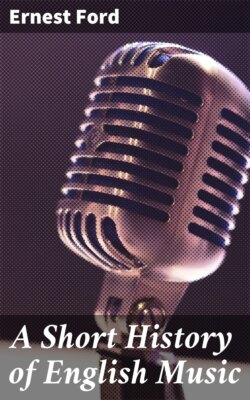Читать книгу A Short History of English Music - Ford Ernest - Страница 13
На сайте Литреса книга снята с продажи.
Footnote
Оглавление[6] The word ballad comes from Ballare, to dance.
[7] "Shakespeare in Music." Louis C. Elson. L. C. Page & Co., Boston.
[8] Cockle hat and staff were distinguishing marks of a pilgrim.
[9] It may be mentioned that there are numerous variations of these, as of all traditional melodies.
[10] Burton: "Anatomy of Melancholy," 1621.
[11] William Chappell's "Music of the Olden Time."
[12] "That will draw three souls out of one weaver" is a line of peculiar interest.
Although it shows a distinct lack of reverence, it is quite typical of the spirit of the time. The "weavers" were mostly Calvinist refugees settled on the East Coast, whose austere manners and mode of life made them a constant source of ridicule to the people among whom they had taken shelter.
The imperious will of the Tudor monarchs had, hitherto, prevented the dissemination of Calvinism in England, and so, to the boisterous, happy-go-lucky temperament of the Elizabethan Englishman, the ostentation of religious phraseology, added, probably, to their quaint pronunciation of the language, made them at once a butt of scorn and contempt.
The expression used, too, by the clown "By'r lady" shows that Protestantism had as yet made little inroad on the life of the people.
It is worthy of note that it was from this part of England sailed the first batch of emigrants to the new world in the "Mayflower," now immortalised in history.
[13] A canon is a form of composition in which a melody is started by one voice and followed by another, one or more bars later (or even less) in strict imitation of it.
